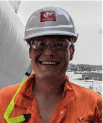Concurrent 10. Presentation for: Collaborating to bring new technology on developments
Ben Witton A * and Vincent Tachoires B *A Woodside, Perth, WA, Australia.
B Subsea 7, Perth, WA, Australia.
The APPEA Journal 62 - https://doi.org/10.1071/AJ21335
Published: 3 June 2022
Abstract
Presented on Wednesday 18 May: Session 10
Project delivery certainty is a key a success factor for positive business outcomes. Taking on world first applications across multiple delivery streams comes with risk that requires significant risk reduction to meeting business requirements. The Julimar Development completed this successfully across both drilling and completions, and subsea. Reliable multizone completions with robust sand control have traditionally been a challenge in high-rate gas wells. Cased hole stacked gravel packs can leave high mechanical skin, require multiple trips and are complex operations. While Open Hole Gravel Packs (OHGPs) have provided reliable sand control in such wells, multizone applications have been limited due to the tradeoff between effective gravel placement and zonal isolation. Recent developments in technology have enabled reliable gravel placement and complete zonal isolation. The collaboration between Woodside and Subsea 7 has delivered an ‘industry first’ on the Julimar Project, with the completion of an 18″ Corrosion-Resistant Alloy (CRA) gas transmission flowline installed via reel-lay – the largest diameter insulated CRA pipeline ever reeled. For background, most projects have traditionally used the ‘S-Lay’ method for installing pipe in Australia – the reel-lay method is less common. A key benefit of the reel-lay method is it removes thousands of welds from the offshore installation vessel critical path, transferring them onshore into a safer, quality-controlled environment earlier in the schedule. Pipe joints are welded into ‘stalks’ which are then spooled onto purpose-built reel-lay vessels. Woodside and Subsea 7 were able to jointly demonstrate the safety, quality, technical and cost advantages of this innovative but field-proven reeled pipe-lay technology. The 18″ CRA flowline is a tangible example of the performance that can be delivered through early collaborative engagement and strategic investment in technology and is a step change in Australia and the industry. This joint presentation discusses contracting, design, execution and evaluation of technologies on the Julimar Development. It includes the method followed for reel-lay technology selection, engineering development, post project evaluation and the health and safety benefits. The presentation provides both the Operator and Contractor perspectives on the challenges of implementing new technology in developments in Australia.
To access the presentation click the link on the right. To read the full paper click here and also here.
Keywords: collaboration, CRA, flowline, lateral buckling, offshore installation, reel-lay, Residual Curvature Method, Subsea 7, technology, Woodside.

Ben Witton holds a Master of Engineering Degree in Aerospace Engineering from the University of Manchester and is Engineering Fellow of IMechE. Ben was the SURF EPCI lead for Julimar Phase 2 Project and has experience from concept definition through to completion of offshore execution and handover to operations. Ben has over 17 years of international pipelay and subsea construction experience. He enjoys work that is technically challenging and creates a positive legacy. Ben is dedicated to a quality outcome and committed to ensuring his team execute work safely without damaging the environment. When not at work, Ben enjoys racing mountain bikes. |
|
Vincent Tachoires has a Bachelor Degree in Marine Engineering (Ecole Superieure d’Ingenieurs de Marseille, France) and over 20 years of experience in the subsea construction industry. He started his career as a graduate engineer with Stolt Offshore Ltd (now Subsea 7) Aberdeen, and worked as a Field Engineer in the North Sea, Middle-East, Gulf of Mexico and West Africa before relocating to Singapore for several years, and moving to Australia in 2008. Vincent has gained extensive experience in the execution of both regional and global projects in subsea construction, diving and pipelay, progressing his career within Subsea 7 through to the position of Package Manager. He most recently completed the Julimar Development Phase 2 project as Engineering and Operations Manager, and is currently responsible for the delivery of the Subsea 7 pipelay package on the Barossa project. |


